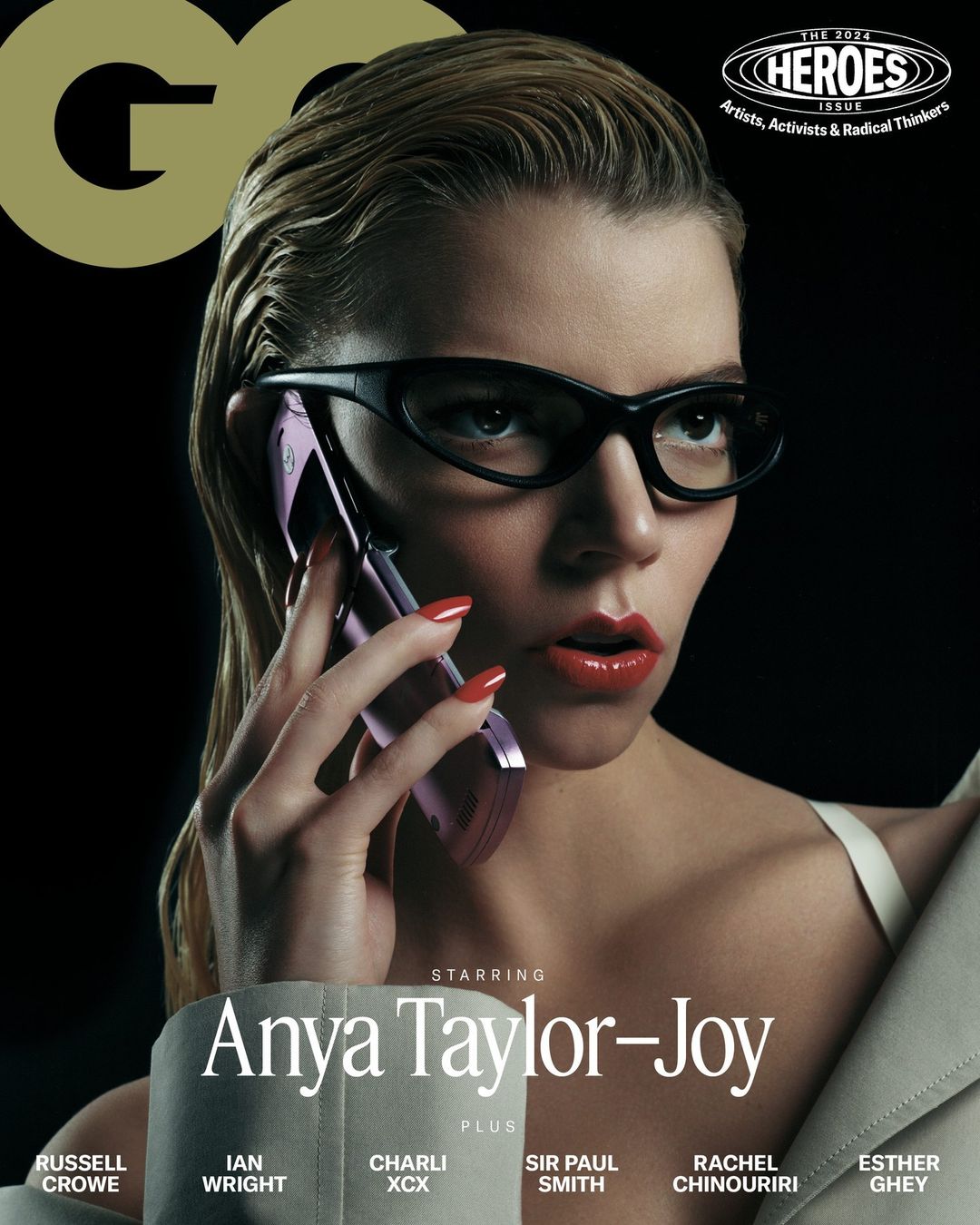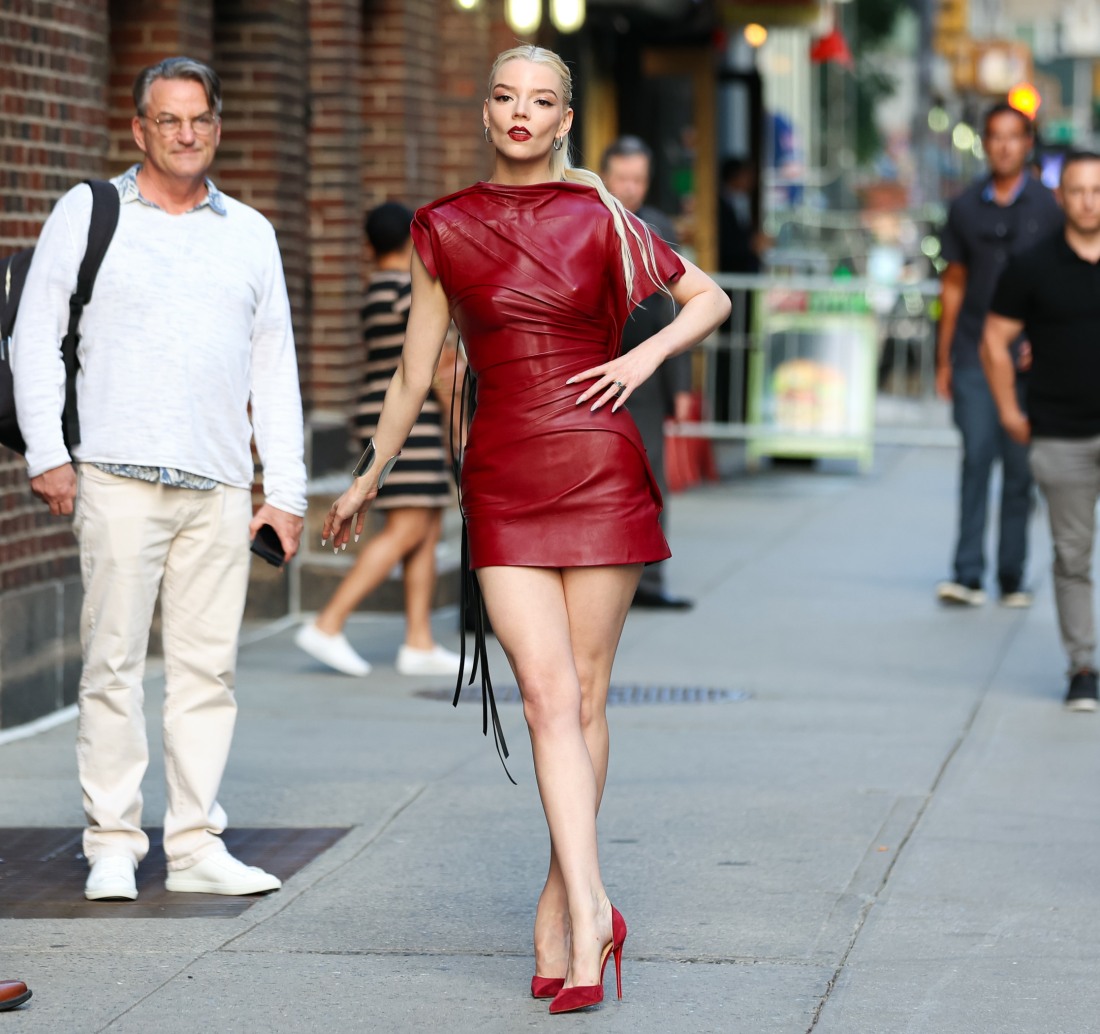Anya Taylor Joy is a funny, interesting person but she really never spills the tea in her interviews. It’s sort of impressive, how she keeps it about work 90% of the time, and whenever some personal stuff spills out, it’s like “I adore my husband” or “I keep weird props in my home.” So it is with Anya’s British GQ cover profile. She’s promoting Furiosa: A Mad Max Saga, and the most interesting part of the interview is where she’s talking about how she fights to bring female rage to the screen. Some highlights:
The throughline of her work is defiance: “As a survival mechanism you learn to be self-effacing and self-deprecating. You bury yourself before anybody else does. What I’m coming to understand is: as long as you’re not causing anyone else harm, you have to stand your ground.”
Fighting for feminine rage: “How do I say this? I’ve developed a bit of a reputation for fighting for feminine rage, which is a strange thing, because I’m not promoting violence – but I am promoting women being seen as people. We have reactions that are not always dainty or unmessy.”
What she suggested for ‘The Menu’: In The Menu, the 2022 dark comedy that skewers the pretensions of wealthy gourmands, Taylor-Joy’s character discovers that her date has intentionally brought her to the film’s restaurant setting to die. It was scripted that her character would respond with a single tear rolling down her cheek. “What planet are we living on? I was like, ‘Let me explain to you: I am going to leap across the table and try and literally kill him with my bare hands,’” she says, adding that director Mark Mylod and co-star Nicholas Hoult were thankfully very game.
She rarely wears her contacts: Taylor-Joy herself doesn’t see the eyes seeing her, because she almost never wears her contact lenses; the slight fuzzing of her vision allows her to zone out from the intensity of being watched.
She’s not an angry person: “For all my championing of female rage, I’ve never been an angry person. For a long time the only time I ever got angry was on other people’s behalfs. I’ve always internalised this thing of ‘I’ve done something wrong. If you treat me badly, it’s because I am the problem.’ And I’m so grateful for Furiosa, because there was a real moment where I started getting angry for myself. My husband was like ‘I’ve never heard you be like this.’ I was like, ‘I’m glad! I’m glad that I’m angry!’ If someone steps on me now I’m like, ‘Hey, f–k you!’ That makes me feel good.”
I love this? I love the artistic exploration of feminine rage, and I love justified feminine rage in life. There’s a lot to be enraged about, if you’re a woman. I see and experience bullsh-t which brings out my feminine rage on a daily basis. Anya’s not saying – and I’m not saying – that it’s okay to be violent or to have aggro reactions to everything, but more women should just get mad and say “f–k off, I’m not taking your bullsh-t.”
Also: if you need contacts, I cannot imagine just going around, never wearing them? I would bump into things constantly.
Photos courtesy of Cover Images, cover courtesy of British GQ.
- Anya Taylor-Joy is seen at The Late Show with Stephen Colbert Where: New York, New York, United States When: 22 May 2024 Credit: BauerGriffin/INSTARimages
- Anya Taylor-Joy is seen at The Late Show with Stephen Colbert Where: New York, New York, United States When: 22 May 2024 Credit: BauerGriffin/INSTARimages
















She and Margo Robbie are in the same boat for me as very beautiful women who can act, and then the more they speak and work, the more interesting they become. It’s the opposite for most celebrities.
I like that she is not selling her personal life for fame.
Pinkosaurus, I agree completely. They are some of my favorite actors, along with Charlize Theron.
I do love her as an actor, very talented.
I also love the fact that she’s fighting for feminine rage.
I’m a woman whose base emotion is anger, and well, societally, it’s ok for a man to be like this, but not a woman. Men are seen as righteous, women seen as ‘crazy’ or ‘too much’. Growing up was hard. Realizing this gave me some sense of freedom about it, but also made me a bit sad.
I’m not an angry person, really, but I do stand up for myself and others and don’t tolerate bs. Women tend to admire me and wish they could be like me, but most don’t want to be friends with me. Most men don’t want to be with someone who speaks their mind as freely as me.
Anyway, not all bad. I have some amazing friends who know I’m loyal to them until the end, and it all feels real, which is great. Husband loves that I’m a take-charge person, and it works well for us.
Why does it have to be “feminine” rage, though? Why not just righteous rage, or female rage, or feminist rage? Or just rage?
As a tomboy, mainstream feminism’s obsession with “feminity = good” makes me feel so isolated. Queer women have been performing the better parts of masculinity and giving them a positive twist for centuries. People also use “feminine” when they mean “female” for some reason, as if they’re the same thing, which is what I think Anya is doing here.
I’m not even mad. I’m just saddened by how feminism sometimes is all about how you need to be This feminine to ride and it leaves queer and gnc women outside of a movement we created and need too.
I dunno, I think you’re attaching connotations to “feminine” that aren’t there for everyone, and I don’t see a problem with her usage of “feminine rage” to mean the same thing as “female rage.”
I don’t want to dismiss your feelings of isolation, but I feel like you’re being critical of her word choice for wrong headed reasons.
“Feminine rage” doesn’t mean it has to do with femininity. It refers to a type of anger relating to the condition of being female in a patriarchal society. It’s a term to distinguish that difference(s) may exist specific to being a part of a certain group. For example, “black rage” might be used to refer to the frustration specific to being systemically demonized on the basis of race. “Male rage” might be used to refer to the resentment and frustration of the strictures of hypermasculinity or machismo. These are contextual terms, it doesn’t mean that every emotion of anger a woman has is automatically female rage. Movie examples of male rage might include Falling Down or American Psycho. Movie examples of female rage might include Promising Young Woman or Kill Bill.
I cannot wait till she’s 3 or 4 movies post-Furiosa and she feels ready to talk about what happened on that set because phew! She has dropped a LOT of nuggets about what a hellish experience the whole thing was for her and I need the TEA!